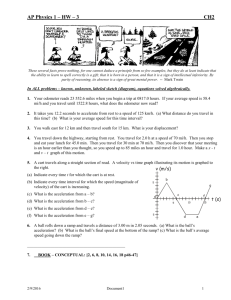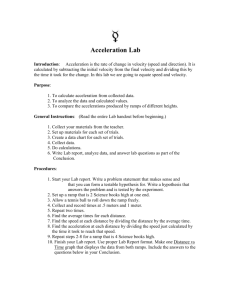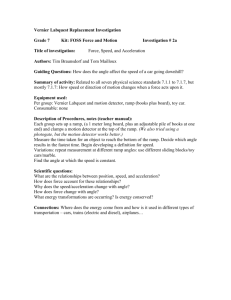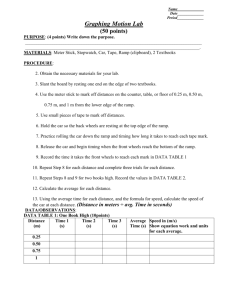Project Planning Form - nice-webb
advertisement
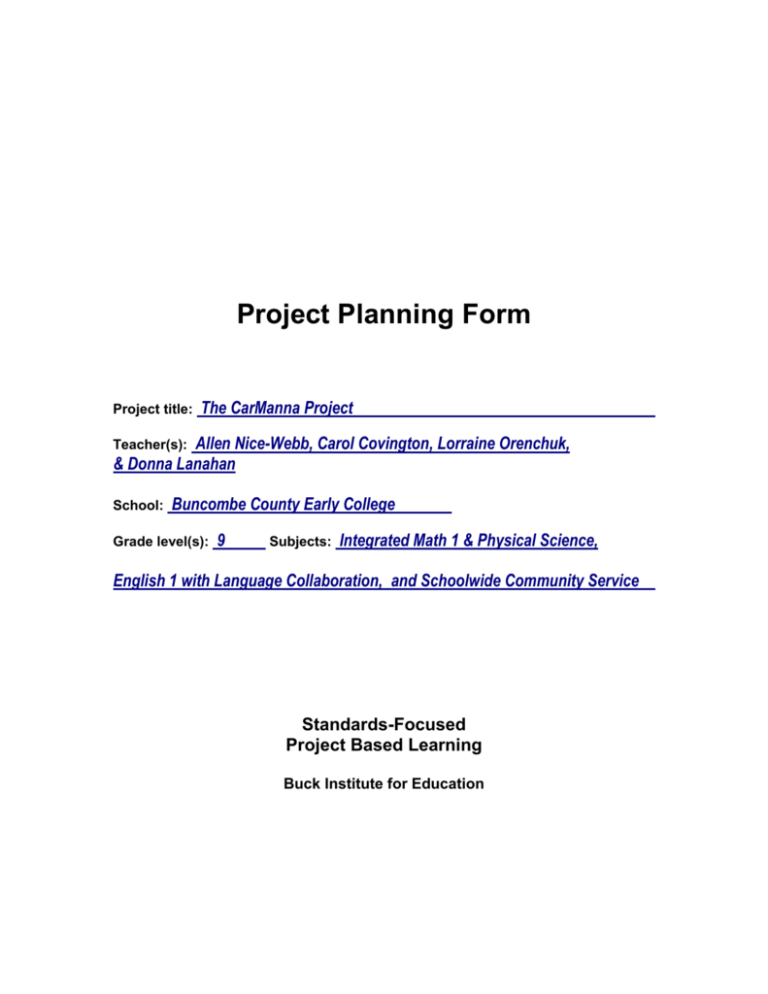
Project Planning Form Project title: The CarManna Project Allen Nice-Webb, Carol Covington, Lorraine Orenchuk, & Donna Lanahan Teacher(s): School: Buncombe County Early College Grade level(s): 9 Subjects: Integrated Math 1 & Physical Science, English 1 with Language Collaboration, and Schoolwide Community Service Standards-Focused Project Based Learning Buck Institute for Education Begin with the End in Mind Summarize the theme or “big ideas” for this project. To explore patterns of change that occur over time. To identify, understand, and apply linear functions to concepts of velocity and acceleration while increasing charitable giving rates in the Asheville area of North Carolina for Manna Food Bank. Identify the content standards Integrated Math 1 - Goal 4.01: Use linear functions or inequalities to model and solve problems; justify results. a) Solve using tables, graphs, and algebraic properties. b) Interpret the constants and coefficients in the context of the problem. Physical Science - Goal 1.02 : Design and conduct scientific investigations to answer questions about the physical world. Physical Science - Goal 2.01 : Measure and mathematically analyze motion: frame of reference, uniform motion, and acceleration. Identify key skills students will learn in this project. List only those skills you plan to : project). assess (2 – 4 per 1. Students will be able to analyze linear data using tables, graphs, equations, and words. 2. Students will be able to use linear data to solve problems involving change over time, such as, velocity and acceleration. Identify the habits of mind that students will practice in this project (1 – 2 per project) 1. Students will use their agendas to appropriately manage their time to complete the project, in an organized manner. 2. Students will develop their ability to be scientific problem solvers, by making math connections. Identify District Outcomes or school-wide outcomes to be included in this project. 1. Students will function as a team as they engage in problem-solving. 2. Students will give their best effort in exploring the challenges of this project. Craft the Driving Question State the essential question or problem statement for the project. The statement should encompass all project content and outcomes, and provide a central focus for student inquiry. --------------------------------------------------------The CarManna Project-------------------------------------------------------How might we (IMAPS-1st, 2nd, & 3rd Blocks) design, build, package and use a toy car and a ramp out of recycled materials to generate at least $300 in contributions to Manna Food Bank within two weeks? "Changing Possibilities" Have you posed an authentic problem or significant question that engages students and requires core subject knowledge to solve or answer? Plan Assessment Step 1: Define the products and artifacts for the project: Early in the project During the project End of project Brainstorm ideas for car, ramp, and package design. Complete constructions of car, ramp, and package. Explore math and science concepts related to linear rates of change. Conduct experiments, collect and analyze data, to make final redesign decisions. Research hunger vs. giving rates to Manna Food Bank. Write a letter for sponsorship invitations. Develop a brochure to communicate The CarManna Project and ways for people to sponsor. Make final construction revisions to the car, ramp, and package. Prepare all product presentations. Redesign constructions and retest in order to maximize results. Submit sponsorship contact information form with projected donations. Note the math and science concepts being used throughout the project. Conduct the CarManna competition. Secure pledged donations and deliver to Manna Food Bank. Complete all sponsorship contacts. Plan Assessment Step 2: State the criteria for exemplary performance for each product: Product: Car, Ramp & Package Construction Criteria: [Demonstration of the scientific method in the design process and construction]. 1. Journal - regular entries with dates, noting the steps of the scientific method your group uses. 2. MUST USE RECYCLED MATERIALS ONLY (no toy car parts, no electrical motors); Allowed: $5 or less purchases/group from Dollar Store or Goodwill (itemized receipt required). 3. Light Car; Long Distance (flat); Straight Path; Great Velocity/Acceleration at bottom of ramp. 4. Size of Car, Ramp & Package Together > Must fit inside a cubic space of 32cm x 32cm x 32 cm. 5. Must be self-propelled and use ramp, and have no external attachments or remote controls. 6. Must be released off of a classroom white table (height = 73.00 cm) and proceed down a ramp. Product: Webfolio Artifacts Criteria: 1. Tables, Graphs, Equations, Sketches, Photos and Written Explanations of how linear functions model velocity and acceleration rates. 2. Tables, Graphs, Equations, Sketches, Photos and Written Explanations of how linear functions model Hunger and Giving Rates to Manna Food Bank in Western North Carolina. Product: Informational & Invitational Letter and/or Brochure Criteria: 1. Include Tables, Graphs, Equations, Sketches, Photos and Written Explanations of how linear functions model hunger and giving rates to Manna Food Bank. 2. Accurate, Current Information; No Spelling Errors; Good Grammar; Neat & Organized; Typed. 3. Be Persuasive in Asking for Donation Sponsorships $1/1 meter the car travels after leaving ramp. 4. Delivered to at least 5 persons (not other year 1 students) per each group member by Sept. 20th. Product: Sponsorships [ $1 per 1 meter per group --- 3 trials, best run, up to 50 meters] Criteria: 1. Obtain at least one sponsorship for your group and try for the Most in your class block. 2. Obtain at least one Money Donation of any amount per group; (actual money receipts). 3. Sponsorships are for $1/1 meter of travel (per group) after leaving the ramp (Birch hallway). Do the products and criteria align with the standards and outcomes for the project? Map the Project Step 1: Look at one major product for the project and analyze the tasks necessary to produce a high-quality product. What do students need to know and be able to do to complete the tasks successfully? How and when will they learn the necessary knowledge and skills? Product: Webfolio Artifacts Knowledge and skills needed (Check appropriate box) Already have learned Taught before the project Taught during the project 1. To collect and organize data in tables 2. To effectively use spreadsheets 3. To analyze linear data/make predictions 4. To solve velocity & acceleration problems 5. To apply linear functions in world context 6. To demonstrate the scientific method 7. To use agendas-manage time constraints What project tools will you use? Know/need to know lists Task lists Webfolio Artifacts Problem logs Journals Sketches Spreadsheets Brochures/letters Do the products and tasks give all students the opportunity to demonstrate what they have learned? Map the Project Step 2: Draw the storyboard for this project. Include a timeline and milestones. Thursday – 9/11 Introduce The CarManna Project Friday – 9/12 Create Design Proposals and Draft Letter/Brochure Monday – 9/15 First Prototype of Car/Ramp & Letter/Brochure Revisions Tuesday – 9/16 Complete Constructions and Begin Data Collection Wednesday – 9/17 Data Collection (con’t) / (Key Science Concepts) Manna Representative/ Marketing Representative Thursday – 9/18 Modeling Linear Relationships (Key Math Concepts) Friday – 9/19 Make Modifications – Retest & Data Collection Monday – 9/22 Final Construction Revisions Possible NasCar College Representative Tuesday – 9/23 Symbolizing Patterns in Data – Mathematical Sense & Science Concepts Wednesday – 9/24 Final Preparations for The CarManna Competition/Presentations Thursday – 9/25 The CarManna Competition & Presentation Friday – 9/26 Formal WebAssign Chapter 10 Motion Test & Lab Practicum SAS Test What community members might be helpful with this project and in what role (for example: consultant, panel member, assessor…)? (name and/or title) /(possible role) Manna Food Bank Explain WNC Hunger/Giving Rates ______________________________________/________________________________________ Day International Explain the Design Process / Assessor ______________________________________/________________________________________ A-B Tech Community College / Marketing ______________________________________/________________________________________ NasCar College / Performance Design Issues / Assessor ______________________________________/________________________________________ With another teacher or team of teachers, use the Tuning Protocol to refine the project design or guide you further in your planning. What other thoughts do you now have on the project? Use the Critical Friends Process to fine tune expectations, identify rigorous assessments, and to examine the quality of student work. What challenges or problems might arise in this project? Manage the Process List significant issues that you anticipate may arise during this project. Timing - Will students be able to focus their work within the time parameters/constraints? Quality Work - How will the students know the quality expectations? Community Involvement - Will there be sufficient time to secure and utilize community resource persons as a part of the design process? List preparations necessary to address needs for differentiated instruction for ESL students, special needs students, or students with diverse learning styles. The use of MAP assessments in the formation of groups Problem-Based Problems (1-3) to model math and science concepts Create options for student choice regarding group responsibilities Structure time for questions and clarifications Create organizers for science journals (log entry samples) Develop math problem samples How will you and your students reflect on and evaluate the project? Class discussion Fishbowl Student-facilitated formal debrief Teacher-led formal debrief Individual evaluations Group evaluations Other: Tuning Protocol to refine PBL process What do you expect to learn from this project? BIE Workshop Participants The Project Description: Now that your planning is complete, summarize your project by describing it in 2–3 sentences: Students will engage in the process of using the scientific method to design a toy car and ramp product to explore linear rates of change, involving velocity and acceleration of a moving object. Students will explore the linear rates of change in a real world issue of declining charitable donation rates and increasing hunger rates in our community. Students will devise a two-week plan to generate at least $150 in donations to Manna Food Bank. Project Title: The CarManna Project List immediate tasks to get the project underway. 1. Contact Community Resource Persons 2. Develop a space for students to store their work 3. Collect some basic tools for students to use in their constructions 4. Secure computer carts at strategic times
